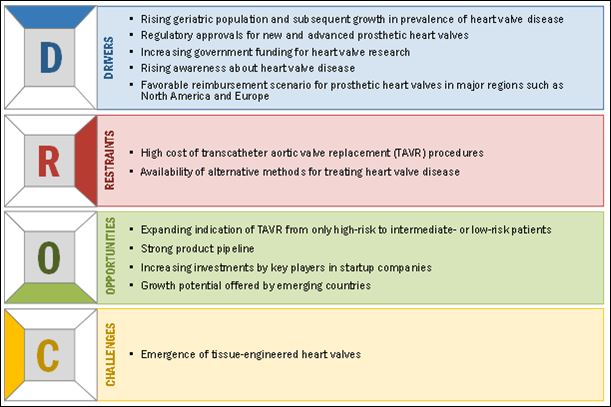The global prosthetic heart valves market is expected to reach USD 8,862.9 million by 2022.

Factors such as rising geriatric population, regulatory approvals for new and advanced prosthetic heart valves, increasing government funding for heart valve research, rising awareness about heart valve diseases, and favourable reimbursement scenario for prosthetic heart valves are driving the growth of the prosthetic heart valves market.
Download FREE Brochure @ https://www.marketsandmarkets.com/pdfdownload.asp?id=245407958
Transcatheter heart valve segment to grow at the highest CAGR during the forecast period
On the basis of type, the global prosthetic heart valves market is categorized into three segments—transcatheter, tissue, and mechanical heart valves. In 2017, the transcatheter heart valves segment is expected to hold the largest share in the global market and grow at the highest CAGR in the forecast period (2017 to 2022). The large share and high growth of this segment can be attributed to factors such as ease of implantation (involving a minimally invasive procedure rather than an open-heart surgery), increasing prevalence of aortic stenosis, and growing patient pool.
High cost of transcatheter aortic valve replacement (TAVR) procedures and availability of alternative methods for treating heart valve diseases (HVDs) are the major restraints for the market.
Transcatheter aortic valve replacement (TAVR), also called as transcatheter aortic valve implantation (TAVI), is a minimally invasive surgical method used for the replacement of aortic heart valves without removing the old heart valves. TAVR is a relatively new method for heart valve replacement in patients who are aged above 80 years or in patients with a high risk of open heart surgery.
Market Dynamics

In the U.S., the cost of a transcatheter heart valve ranges from USD 25,000 to USD 30,000, which is much higher than surgical valves that cost USD 5,000 to USD 10,000. Even though the cost of hospital and ICU stay in TAVR procedures is lesser than in SAVR procedures, it does not balance out the high cost of transcatheter heart valves. Moreover, permanent pacemakers are required to be implanted in some of the patients who have undergone TAVR procedures. The implantation of pacemakers adds up to the cost of the overall treatment.
Reimbursement for TAVR procedures is complicated as it includes patients being examined by a multidisciplinary team, which involves multiple cardiac surgeons and interventional cardiologists. These factors are expected to hinder the growth of the TAVR market in the coming years.
There are multiple alternative options available for treating heart valve diseases such as Medication and heart valve repair. Medication is used to increase the heart’s ability to pump blood, which helps compensate for the valve which is not working. Additionally, repair of heart valves can be carried out by means of open-heart surgery or minimally invasive methods. Heart valve replacement is used as a last resort.
To Know More @ https://www.marketsandmarkets.com/Market-Reports/prosthetic-heart-valve-market-245407958.html